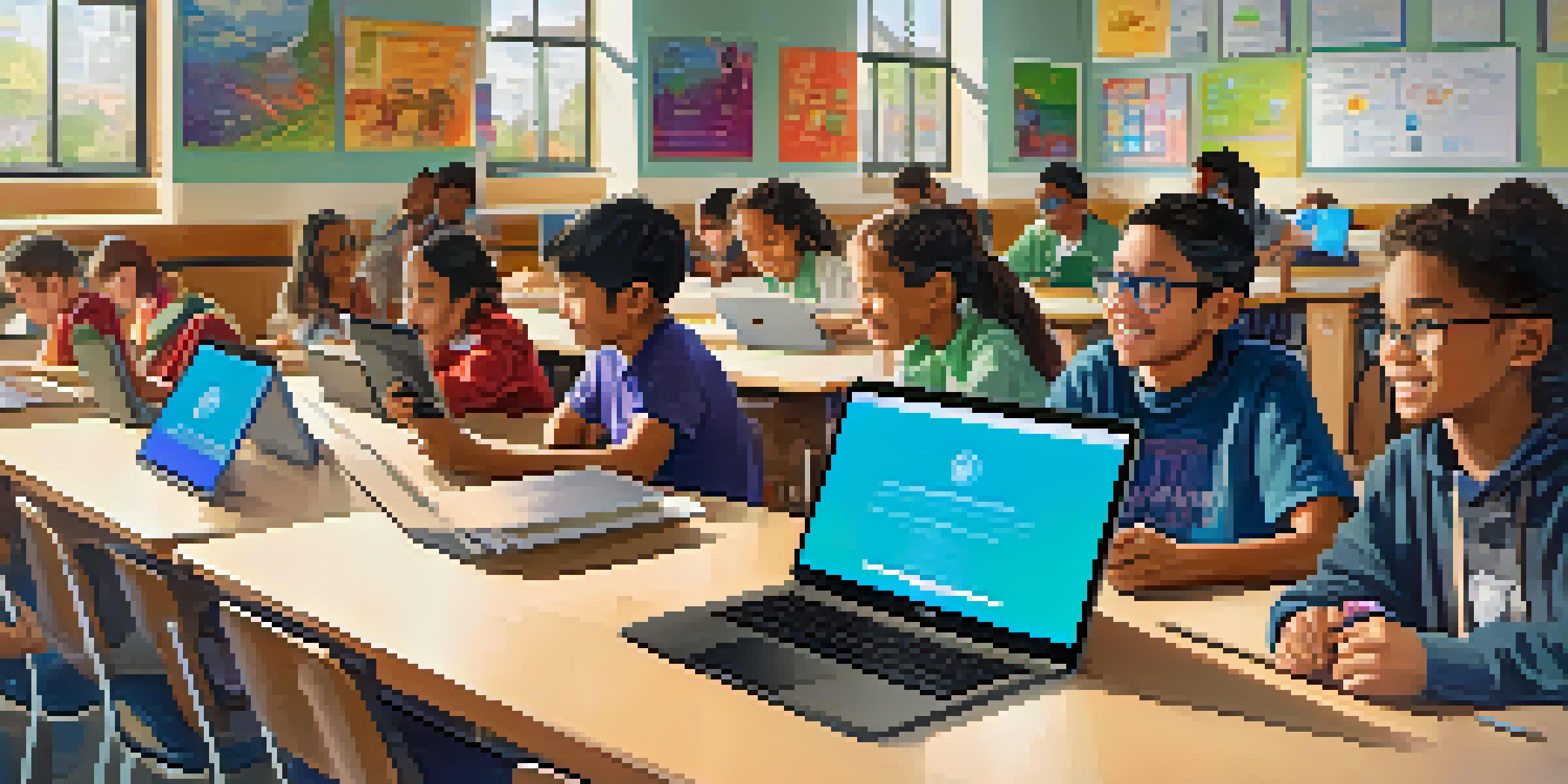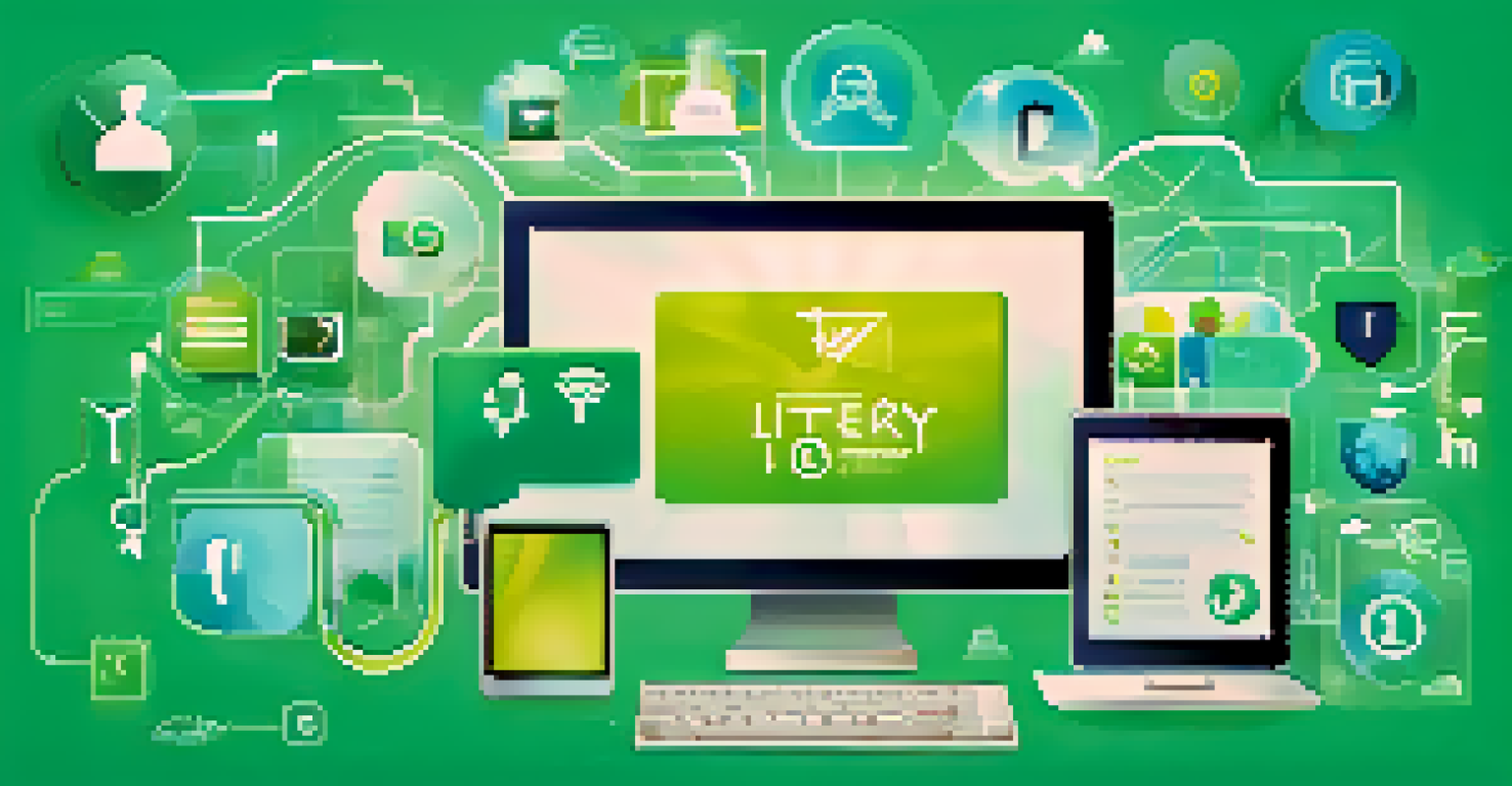The Influence of Digital Literacy on Learning Communities

Understanding Digital Literacy and Its Importance
Digital literacy refers to the skills required to effectively navigate and utilize digital technologies. In today's world, this means not only knowing how to use devices like computers and smartphones but also understanding how to assess the credibility of online information. With the overwhelming amount of data available, having a solid grasp of digital literacy is crucial for both personal and academic success.
Digital literacy is not just about knowing how to use technology; it’s about understanding how to find, evaluate, and use information effectively.
Moreover, digital literacy goes beyond mere technical skills; it encompasses critical thinking and problem-solving abilities in a digital context. For example, evaluating the reliability of a source requires a blend of analytical skills and digital experience. As students and educators become more digitally literate, they can better engage with content and foster a more enriching learning environment.
Ultimately, enhancing digital literacy is vital as it empowers individuals to participate confidently in a technology-driven society. This foundation enables learners to thrive in various settings, making digital literacy an essential element of modern education.
The Role of Digital Literacy in Learning Communities
Learning communities are groups of individuals who come together to share knowledge and experiences, often facilitated by technology. Digital literacy plays a pivotal role in these communities by enabling effective communication and collaboration. When members are digitally literate, they can leverage various tools—such as discussion forums, video conferencing, and collaborative documents—to enhance their learning experiences.

For instance, consider an online study group that uses a shared document to compile notes and insights. Members who possess strong digital skills can easily contribute, access resources, and provide feedback, creating a dynamic and interactive learning environment. This collective effort fosters a sense of belonging and encourages knowledge sharing among members.
Digital Literacy Empowers Learning
Digital literacy equips individuals with the skills to navigate technology and assess online information, enhancing personal and academic success.
In essence, digital literacy strengthens the bonds within learning communities by ensuring that all participants can engage meaningfully. As a result, these communities become more vibrant and effective, leading to improved learning outcomes for everyone involved.
Impact on Student Engagement and Motivation
One of the most significant advantages of digital literacy in learning communities is its impact on student engagement. When students are equipped with the skills to navigate digital platforms, they are more likely to participate actively in discussions and collaborative projects. This heightened engagement often leads to increased motivation, as learners feel empowered to express their ideas and take ownership of their learning.
The future belongs to those who understand how to use technology effectively and who are willing to adapt to a rapidly changing world.
Additionally, digital literacy allows students to explore diverse resources and perspectives, broadening their understanding of subjects. Imagine a classroom where students can seamlessly connect with experts or peers across the globe, enriching their learning experience. This access to varied viewpoints not only makes learning more engaging but also fosters critical thinking and creativity.
In conclusion, when students possess strong digital literacy skills, they are more inclined to engage and invest in their learning. This engagement ultimately translates to better academic performance and a more fulfilling educational journey.
Fostering Inclusivity in Learning Environments
Digital literacy is instrumental in creating inclusive learning environments. By equipping all learners with essential digital skills, educational institutions can bridge gaps that may exist due to varying levels of access to technology. Ensuring that everyone has the opportunity to develop these skills promotes equity and allows all students to thrive in a digital landscape.
For example, consider a scenario where a learning community implements digital literacy workshops. Such initiatives provide support for those who may struggle with technology, enabling them to participate fully in discussions and activities. When everyone has the tools to succeed, the entire learning community benefits from diverse voices and ideas.
Inclusivity Through Digital Skills
By fostering digital literacy, educational institutions can create inclusive environments that promote equity and diverse perspectives among learners.
Ultimately, fostering digital literacy not only supports individual learners but also cultivates a richer, more collaborative learning environment. This inclusivity is essential for preparing students to navigate and contribute to a diverse and interconnected world.
Challenges in Promoting Digital Literacy
Despite the many benefits of digital literacy, promoting these skills within learning communities can be challenging. One significant hurdle is the varying levels of access to technology among students. In some cases, students may not have reliable internet access or devices, hindering their ability to develop digital skills effectively.
Additionally, there may be a lack of resources or training for educators on how to teach digital literacy. Without proper guidance, instructors might struggle to incorporate digital literacy into their curricula, limiting students' exposure to essential skills. This gap can create disparities in digital competence within the learning community.
Addressing these challenges requires a concerted effort from educational institutions, policymakers, and communities. By investing in infrastructure, providing training for educators, and creating inclusive programs, we can ensure that all learners have the opportunity to enhance their digital literacy.
The Future of Learning Communities and Digital Literacy
As technology continues to evolve, so too will the landscape of learning communities. The increasing reliance on digital tools in education underscores the importance of digital literacy for future generations. Learning communities must adapt to these changes by continually integrating new technologies and teaching methods that prioritize digital skill development.
Looking ahead, we can expect to see more hybrid learning environments that blend in-person and online experiences. This shift necessitates that both students and educators remain digitally literate to navigate these dynamic settings effectively. Embracing lifelong learning in digital literacy will be essential for success in this evolving educational landscape.
Adapting to Future Learning Needs
As education increasingly relies on technology, cultivating digital literacy will be essential for students and educators to thrive in hybrid learning environments.
In summary, the future of learning communities hinges on the ability to cultivate digital literacy among all members. By prioritizing these skills, we can ensure that learners are prepared to thrive in an increasingly digital world.
Conclusion: The Ongoing Need for Digital Literacy
In conclusion, the influence of digital literacy on learning communities cannot be overstated. It serves as a cornerstone for effective communication, collaboration, and engagement among members. As we navigate a world that becomes more reliant on technology, fostering digital literacy will be critical for ensuring that all learners can succeed.
Moreover, the benefits of digital literacy extend beyond academic achievement; they prepare students for future careers and civic participation. In an age where information is readily available, being digitally literate empowers individuals to make informed decisions and contribute positively to society.

As we move forward, let us commit to prioritizing digital literacy within learning communities. By doing so, we can create inclusive, engaging, and effective educational experiences that benefit everyone involved.